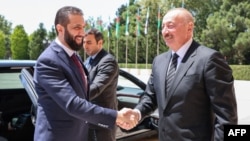Syrian interim President Ahmad al-Sharaa’s visit to Baku last weekend highlighted a dramatic shift in regional alliances, prompting a mix of concern, suspicion, and strategic recalculation across Iranian media.
Official statements following Sharaa’s meeting with President Ilham Aliyev emphasized a new era in Syrian-Azerbaijani relations. Both leaders acknowledged past stagnation, directly blaming ousted President Bashar al-Assad’s “unfriendly policy” and pledged to restore and deepen cooperation.
Notably, the visit yielded a deal to export Azerbaijani gas to Syria via Turkey, with officials hailing the agreement as a needed remedy for Syria’s chronic energy crisis.
Meanwhile, various outlets, including Israeli media, claimed that Syrian and Israeli officials met on the sidelines of the trip. It’s unclear whether Sharaa attended the meeting, but the mere occurrence of such a meeting -- facilitated by Azerbaijan, Israel’s key ally in the region -- has further fueled concerns in Tehran.
Sharaa, a former insurgent known under the nom de guerre Abu Mohammed al-Jolani, joined forces with Turkish‑backed rebels and, in December 2024, led his Hayat Tahrir al‑Sham (HTS) faction in a lightning offensive that ultimately toppled the Iran‑ and Russia‑backed Assad government.
Security Challenges
A shared concern in Iranian media is what is seen as a shifting militant footprint from the Syrian battlefield to the Caucasus -- right on Iran’s doorstep.
Arman-e Melli, a pro-reform newspaper, argued that one aspect of the budding relationship between Damascus and Baku will involve the transfer of Syria-based fighters through Turkey into bases in Azerbaijan -- a potential development it described as a “mission” for Sharaa.
It speculated that their presence is meant to destabilize areas along the borders of Iran and Russia and to carry out operations targeting the broader axis of China, Russia, and Iran.
The conservative newspaper Farhikhtegan struck a similar tone, arguing that Sharaa sees the redeployment of his fighters to meet a US demand to expel foreign fighters from Syria. Under such a plan, the paper said, Azerbaijan would emerge as a strategic hub; either a staging ground for further infiltration into the Caucasus and Russia or a site for settlement in areas such as Karabakh.
A ‘Message’ To Iran
Israel’s i24NEWS network, citing an unnamed Syrian source, claimed that Israel and the United States had made decision for Baku to host a meeting between Israeli and Syrian officials to “send a message to Iran.”
Referencing the report, Iran’s state broadcaster-run Jam-e Jam newspaper charged that given Baku’s track record of alleged involvement in anti‑Iranian operations over the years, and suspicions about its cooperation with Israel during the last month’s war, this could well be taken as “clear evidence” that some neighboring countries are working with Israel against Iran.
Jam-e Jam specifically named Azerbaijan and its allies Turkey and Israel as the countries involved in “shaping new dynamics that work against Iran’s interests.”
The paper argued that ultimately Iran will need to safeguard its national interests with both diplomatic and security savvy, including strengthening ties with neighbors such as Armenia and Russia, and taking a firm stand against “Baku’s provocations.”
Tehran has watched with growing concern as Azerbaijan forges ever‑closer links with Israel.
In recent years, the partnership has significantly expanded, highlighted by deepening defense collaboration and Baku’s decision to open an embassy in Tel Aviv in 2023 -- developments that have only heightened Iranian mistrust.
Iran’s president, Masud Pezeshkian, last month pressed Aliyev to “investigate and verify” reports that Israeli drones, including micro‑drones, had crossed into Iranian airspace through Azerbaijani territory during the 12-day war the ended in a ceasefire on June 24.
Aliyev rejected the allegations, affirming that his government would never permit Azerbaijani territory to be used against Iran.










